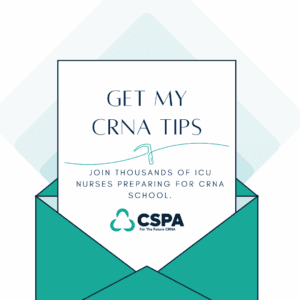
What are the best CRNA schools? With over 100+ to choose from, it’s a reasonable question to ask. Furthermore, choosing your CRNA program is one of the biggest decisions you’ll make in your career.
However, if you’re relying solely on rankings to make that choice—you might be missing the bigger picture.
While reports like the US News & World Report rankings can offer some insight, they don’t necessarily reflect the true quality of a program or how well it will prepare you for success.
The reality? The “best” CRNA school is highly subjective—what works for one student might not work for another. Factors like clinical rotations, student support, affordability, and program culture all play a huge role in shaping your experience.
Plus, no matter where you go, you’ll take the same National Certification Exam (NCE) and earn the same CRNA credential.
In this post, we’ll break down what CRNA rankings really measure, what they DON’T tell you, and how to identify the best program for YOU.
Whether you’re aiming for a well-known program or considering a lesser-known (but equally strong) option, this post will give you the tools to make a confident decision about your future.
Plus, don’t miss out on our Free Resource Guide- The Most Affordable CRNA Schools at the end of this post!
Join the Free CSPA Community!
Best CRNA Schools: How to Choose the Right Program for YOU
Welcome back, Future CRNA! If you’ve been googling “The Best CRNA Schools” on your journey to becoming a CRNA, chances are you’ve seen the US News & World Report rankings for nurse anesthesia programs. These rankings can seem like a helpful guide, but here’s the truth: the “best” CRNA school is highly subjective.
While rankings offer some insight, they don’t tell the whole story. There are so many factors that influence whether a CRNA program is the right fit for YOU. Let’s dive into what really matters when choosing a program and how to determine your personal best CRNA school.
What Do CRNA Rankings Really Measure?
When you see a CRNA program ranked highly in US News & World Report, you might assume it reflects the program’s academic rigor, clinical experience quality, or student satisfaction. However, the ranking methodology is far simpler—and perhaps surprising.
The US News & World Report rankings for CRNA programs are determined by a peer reputation survey. Specifically, program directors, assistant directors, and deans are asked to rate other CRNA programs on a scale of 1 (marginal) to 5 (outstanding). That’s it.
There are no objective data points factored into these rankings—no consideration of clinical experience, case volume, first-time board pass rates, tuition costs, student resources, or faculty quality.
Even more surprising? Not all programs respond to the survey. In fact, only around half of CRNA programs typically participate, meaning a large portion of programs are ranked based on the opinions of administrators who may have little or no direct knowledge of them.
Additionally, these ratings are based on professional impressions rather than measurable educational outcomes. This means a well-known program with a long history may rank higher simply due to name recognition, while a newer program with excellent training and resources may be overlooked.
This isn’t to say that rankings are meaningless—they can offer some insight into how a program is perceived within the academic community. However, they should not be the sole deciding factor when choosing a CRNA program.

Best CRNA Schools: The “best” CRNA school isn’t about rankings—it’s about fit. What works for one student may not be ideal for another.
Instead, it’s crucial to dig deeper and evaluate programs based on metrics that truly impact your education and future success.
It’s also important to note that attending a prestigious or “well-known” CRNA program doesn’t necessarily mean you’re getting a better education than at a lesser-known or more affordable school. Regardless of where you train, you will take the same National Certification Exam (NCE) and earn the same credentials.
Employers typically care more about your skills and competence than the name of the university on your diploma. Additionally, your salary as a CRNA is unlikely to be significantly higher just because you attended a more well-known program.
What REALLY Makes a CRNA Program the Best for You?
Rather than relying on rankings, consider these key factors when determining the best CRNA school for your unique needs:
1. Culture & Mission: Do They Align with Your Values?
Every CRNA program has its own culture, values, and teaching philosophy. Some schools focus heavily on independent practice, while others emphasize academic research. Ask yourself:
-
Does this program’s mission align with my long-term career goals?
-
Do they emphasize leadership, advocacy, or rural anesthesia?
-
Will I thrive in their learning environment?
-
Are they supportive of their students?
2. Clinical Experience & Rotations
Not all clinical experiences are created equal! Some programs offer a variety of case types and high-acuity settings, while others may be more limited. Consider:
-
Case Volume: Will you graduate with strong experience in regional anesthesia, OB, trauma, and cardiac cases?
-
Clinical Locations: Are they in hospitals you want to work at? Will you have to relocate for rotations? Do they offer a variety of clinical experience, including independent practice opportunities?
-
Housing Support: Does the program assist with housing for clinical rotations, or are you left to figure it out on your own? Are they in cities where housing and the cost of living is more expensive?
3. Student Support & Resources
CRNA school is intense, and student wellness support makes a huge difference. Look for programs that offer:
-
Academic support: Are remediation opportunities available if you struggle with coursework?
-
Mental health resources: Does the school offer mental wellness support or counseling?
-
Mentorship programs: Will you have access to faculty mentors or peer support from fellow SRNAs or cohorts that are ahead of yours?
4. Board Pass Rates & Attrition Rates
A program’s first-time board pass rate can give insight into how well they prepare students for the National Certification Exam (NCE). Similarly, attrition rates indicate whether students feel supported and successful in the program. Look for:
-
A high first-time NCE pass rate (typically above 85%)
-
A low attrition rate (ideally under 10%)—high attrition may indicate issues with program support or student satisfaction.
-
Don’t be afraid to ask a program about their stats, for example, what caused a higher attrition rate, especially if it’s not part of a trend. No board passing rates for a new program? No worries! Explore why attending a newer CRNA school isn’t something to shy away from here: Should I Attend a New CRNA School?
5. Tuition & Cost vs. Value
The most expensive CRNA school isn’t always the best. Consider:
-
Total tuition and fees (cost of attendance vs. tuition alone can make a big difference!)
-
Cost of living near the program and its clinical sites
-
Scholarship and financial aid opportunities
-
The potential salary increase after graduation vs. student loan debt
For more on paying for CRNA school, click here: CRNA School Costs: A Comprehensive Guide to Paying for CRNA School
How to Find YOUR Best CRNA School
Instead of relying solely on rankings, take these steps to find the right CRNA program for you:
-
Do Your Research: Visit program websites, attend open houses, and ask questions on the Free CSPA CRNA Program Discussion Board.
-
Ask Questions: Contact programs to ask about clinical training, student support, and mentorship.
-
Talk to Current & Former Students: Get real insights from those who have been through the program.
-
Trust Your Gut: The best CRNA school is the one where you feel supported, challenged, and prepared for success.
The Bottom Line
The “best” CRNA school isn’t about rankings—it’s about fit. What works for one student may not be ideal for another. Instead of chasing a name on a list, focus on finding a program that aligns with your goals, values, and personal needs.
At CRNA School Prep Academy, we’re here to help you navigate this journey with confidence. No matter which program you choose, the most important factor in your success is YOU.
Choose wisely, stay committed, and you’ll thrive in your CRNA career!
Don’t forget to snag your free copy of The Most Affordable CRNA Schools here: www.cspaedu.com/affordable
PS- If you want more guidance, be sure to keep in touch with us on social – you can find us @crnaschoolprepacademy on your favorite platforms.
And if you haven’t yet joined us inside ICU Dreaming of Anesthesia, our FREE community for nurses considering CRNA, what are you waiting for?
Create your FREE account so you can connect with fellow nurses pursuing CRNA for support & encouragement as well as our team + CRNA Program Faculty mentors for answers and insights in a safe space that’s free from negativity and misinformation.
Create your free account here: https://www.cspaedu.com/community
We’ll see you inside.
Cheers to your future, CRNA!
-Jenny Finnell, MSN, CRNA
Founder and CEO of CRNA School Prep Academy
Important Links
Get CRNA School insights sent straight to your inbox! Sign up for the CSPA email newsletter: https://www.cspaedu.com/podcast-email
Book a mock interview, resume or personal statement critique, transcript review and more: www.teachrn.com





0 Comments